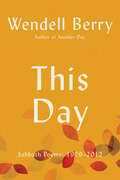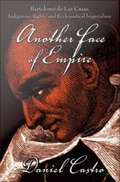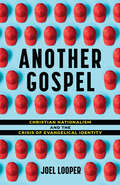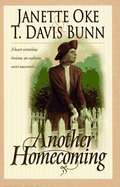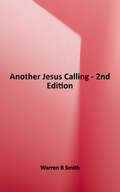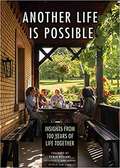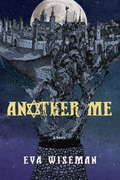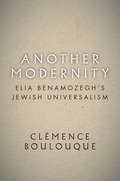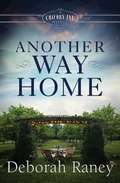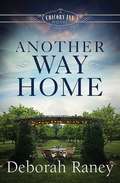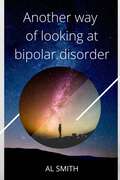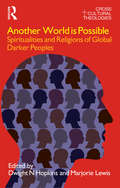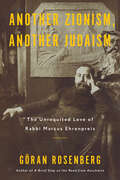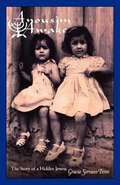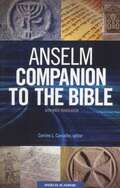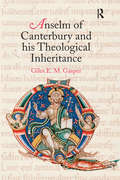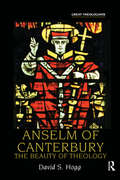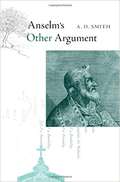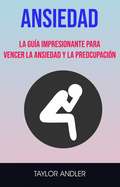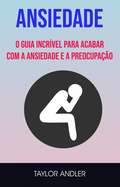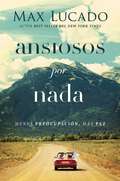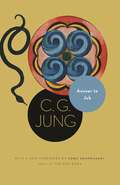- Table View
- List View
Another Day: Sabbath Poems 2013-2023
by Wendell BerryA new collection of poems and the companion volume to the popular bestseller This Day, Wendell Berry's Another Day is another stunning contribution to the poetry canon from one of America's most beloved writersA companion to his beloved volume This Day and Wendell Berry's first new poetry collection since 2016, this new selection of Sabbath Poems are filled with spiritual longing and political extremity, memorials and celebrations, elegies and lyrics, alongside the occasional rants of the Mad Farmer, pushed to the edge yet again by his compatriots and elected officials.With the publication of this new edition, it has become increasingly clear that the Sabbath Poems have become the very heart of Berry&’s work.
Another Face of Empire: Bartolomé de Las Casas, Indigenous Rights, and Ecclesiastical Imperialism
by Daniel CastroThe Spanish cleric Bartolom de Las Casas is a key figure in the history of Spain's conquest of the Americas. Las Casas condemned the torture and murder of natives by the conquistadores in reports to the Spanish royal court and in tracts such as A Short Account of the Destruction of the Indies (1552). For his unrelenting denunciation of the colonialists' atrocities, Las Casas has been revered as a noble protector of the Indians and as a pioneering anti-imperialist. He has become a larger-than-life figure invoked by generations of anticolonialists in Europe and Latin America. Separating historical reality from myth, Daniel Castro provides a nuanced, revisionist assessment of the friar's career, writings, and political activities. Castro argues that Las Casas was very much an imperialist. Intent on converting the Indians to Christianity, the religion of the colonizers, Las Casas simply offered the natives another face of empire: a paternalistic, ecclesiastical imperialism. Castro contends that while the friar was a skilled political manipulator, influential at what was arguably the world's most powerful sixteenth-century imperial court, his advocacy on behalf of the natives had little impact on their lives. Analyzing Las Casas's extensive writings, Castro points out that in his many years in the Americas, Las Casas spent very little time among the indigenous people he professed to love, and he made virtually no effort to learn their languages. He saw himself as an emissary from a superior culture with a divine mandate to impose a set of ideas and beliefs on the colonized. He differed from his compatriots primarily in his antipathy to violence as the means for achieving conversion.
Another Gospel: Christian Nationalism and the Crisis of Evangelical Identity
by Joel LooperJoel Looper offers his fellow evangelicals a theological rationale for resisting Christian nationalism. I am astonished that you are so quickly deserting the one who called you in the grace of Christ and are turning to a different gospel—not that there is another gospel, but there are some who are confusing you and want to pervert the gospel of Christ. So wrote Paul to the Galatians who demanded the circumcision of gentile converts. Such rigid adherence to the old law prioritized one culture over the universal church. Joel Looper hears an urgent message for American Christians today in this biblical controversy. Though evangelicals emphasize fidelity to the gospel above all else, many have fallen in step with &“a different gospel&”—that of Christian nationalism. Analyzing Scripture, church history, and current events in the United States and Russia, Looper shows how the nation can supplant the church as Christians&’ primary allegiance—and why Jesus calls us to a different kind of community. He also engages directly with Christian nationalist authors, exposing their distortions of theology. Looper communicates a fresh, insider&’s perspective on how this false gospel has colonized American evangelicalism. He also shows us how we can revive the traditional Christian vision of community, drawn together by the Holy Spirit. Thoughtful and balanced, Another Gospel offers readers a way out of the rut of a well-worn argument—and a way forward for the American church.
Another Hives Of Bees
by Beverly SoderholmA collection of children story designed to encourage christian values. BEE THOUGHTFUL, from a story called "Two Ways of Telling a Story" by Henry K. Oliver from 4th Grade McGuffey Reader. BEE DILIGENT, from story called "The Young Soldier" in the Sunshine Magazine, Oct. 1954 BEE DEVOTED, from a story by Harry Foster in The Witness and Testimony, 1955 BEE THOROUGH, from a story by Harry Foster in The Witness and Testimony, 1965 BEE UNSELFISH, from a story by Harry Foster in The Witness and Testimony, 195 5 BEE DETERMINED, from a story by Harry Foster in The Witness and Testimony, 1961 BEE RESOLUTE, from THE SUNSHINE MAGAZINE BEE LOYAL, from a story by Harry Foster in The Witness and Testimony, 1956 BEE TEACHABLE, from a story by Harry Foster in The Witness and Testimony, 1958 BEE CONSECRATED, from a story by Harry Foster in The Witness and Testimony, 1959 BEE TRUTHFUL, from a story by Anna Lee Carlton in the magazine, Bread for Children, Nov. 1972 46 ElVerano Rd, Arcadia, Fla. 33821 BEE HONEST, from a story by Harry Foster in The Witness and Testimony, 1963 BEE APPRECIATIVE, from a story called "Harry's Riches" in the 4th Grade McGuffey Reader. BEE TRUTHFUL, from a story by Anna Lee Carlton in the magazine, Bread for Children, March 1973 BEE CONTENT, from a story by Harry Foster in The Witness and Testimony, 1967 BEE THANKFUL, from a story by Harry Foster in The Witness and Testimony, 1961
Another Homecoming
by Janette Oke Davis BunnDuring World War II Martha faces difficult decisions when her husband is reported missing in action. THE WORLD IS AT WAR. A young man bravely kisses his weeping bride goodbye at the train station, leaving her all alone. Then the dreaded telegram, and a decision that nearly tears her apart... A LITTLE GIRL GROWS into young womanhood, unaware of the forces that swirl around her past and her future. WILL THERE BE... Another Homecoming
Another Jennifer (Jennifer #11)
by Jane Sorenson""Why Lord?" Why did you let those stupid girls say that?" Jennifer King reached over and touched my hand. "It's OK, Jennifer," she said softly. But Jennifer Green knows it isn't OK for Lindsay and Stephanie to make remarks about the new Jennifer--who happens to be black. And Pete knows it isn't OK to tease Walter just because he's big. And Heidi tells Jennifer that if she had judged by first impressions, she and Jennifer would never have become friends. And when a plan for admitting handicapped kids is introduced at school, Jennifer and her classmates wonder if they'll know how to treat "those kids."
Another Jesus Calling, 2nd Edition: How Sarah Young's False Christ is Deceiving the Church
by Warren B. SmithInspired by the New Age book God Calling, Sarah Young claims to be receiving messages from Jesus Christ which she compiled into what is now her best-selling book, Jesus Calling. Author Warren Smith carefully documents his concerns about her book, “Jesus,” and the New Age implications contained in many of Young’s devotional messages. He also warns about the danger of contemplative prayer and in elevating spiritual experiences over the Word of God. “Another Jesus” Calling is his call for much needed discernment in these very deceptive times.
Another Life Is Possible: Insights From 100 Years Of Life Together
by Rowan Williams Danny Burrows Clare StoberA stunning photo essay paired with 100 stories of members gives a rare glimpse into the Bruderhof, a Christian community that has stood the test of time. Yes, it is possible to create a society where there are no rich or poor, where children and elderly are welcome, where no one lives in isolation. Meet 100 individuals from diverse backgrounds who ventured everything to build a life together where everyone belongs and each can contribute, pooling their income, possessions, talents, and energy. As the community marks its first 100 years, the people in this book tell why they have chosen this radical way of life and share insights gleaned along the way. Their stories represent a cross section of the Bruderhof as an international and intergenerational community. With photography by British photojournalist Danny Burrows, this book celebrates what is possible when people take a leap of faith. It will inspire anyone working to build a more just, peaceful, and sustainable future.
Another Me
by Eva WisemanSet against the backdrop of plague-ravaged Europe, this spellbinding new novel from one of Canada's foremost writers of historical fiction for young people will have readers racing to the electrifying climax. Seventeen-year-old Natan has a safe and happy life in fourteenth-century Strasbourg, France. He works with his father in his rag trade, helps his mother around the house, and studies the Torah at night with his young brother, Shmuli. He's even feeling the first stirrings of love with Elena, the daughter of the master draper who is his father's best customer. But something is rotten in the streets of Strasbourg. There is tension between the Jewish community and the rest of the citizens, and there is fear as the deadly plague sweeps through towns and cities nearby. When rumors begin to circulate that Jewish residents are contaminating the town's well water to try to hasten the plague's arrival in their city, Natan knows that there are dangerous days ahead. When he sees who really poisoned Strasbourg's water, he is determined to speak the truth and save his people from the false accusations being made against them. But a moment of violence threatens to derail his plans and change his life in ways he could never have imagined.
Another Modernity: Elia Benamozegh’s Jewish Universalism (Stanford Studies in Jewish History and Culture)
by Clémence BoulouqueAnother Modernity is a rich study of the life and thought of Elia Benamozegh, a nineteenth-century rabbi and philosopher whose work profoundly influenced Christian-Jewish dialogue in twentieth-century Europe. Benamozegh, a Livornese rabbi of Moroccan descent, was a prolific writer and transnational thinker who corresponded widely with religious and intellectual figures in France, the Maghreb, and the Middle East. This idiosyncratic figure, who argued for the universalism of Judaism and for interreligious engagement, came to influence a spectrum of religious thinkers so varied that it includes proponents of the ecumenical Second Vatican Council, American evangelists, and right-wing Zionists in Israel. What Benamozegh proposed was unprecedented: that the Jewish tradition presented a solution to the religious crisis of modernity. According to Benamozegh, the defining features of Judaism were universalism, a capacity to foster interreligious engagement, and the political power and mythical allure of its theosophical tradition, Kabbalah—all of which made the Jewish tradition uniquely equipped to assuage the post-Enlightenment tensions between religion and reason. In this book, Clémence Boulouque presents a wide-ranging and nuanced investigation of Benamozegh's published and unpublished work and his continuing legacy, considering his impact on Christian-Jewish dialogue as well as on far-right Christians and right-wing religious Zionists.
Another Way Home
by Deborah RaneyGrant and Audrey are adding grandchildren to their family left and right, but middle daughte, Danae, and her husband, Dallas Brooks, have been trying for years with no baby in sight. Though Danae is ready to consider adoption, Dallas will not even discuss it. Despairing of ever having a family of her own, Danae decides to pour her passion and energies into volunteer work with a newly opened women's shelter in town. Looking for a good cause to fill her lonely days, she never expects to give her heart to the hurting women she meets there. She's finally learning to live her life with gratitude, but then heart-wrenching events on Thanksgiving weekend threaten to pull the entire Whitman clan into turmoil--and leave them all forever changed.
Another Way Home
by Deborah Raney"Grant and Audrey are adding grandchildren to their family left and right, but middle daughter, Danae, and her husband, Dallas Brooks, have been trying for years with no baby in sight. Though Danae is ready to consider adoption, Dallas will not even discuss it. Despairing of ever having a family of her own, Danae decides to pour her passion and energies into volunteer work with a newly opened women's shelter in town. Looking for a good cause to fill her lonely days, she never expects to give her heart to the hurting women she meets there. She's finally learning to live her life with gratitude, but then heart-wrenching events on Thanksgiving weekend threaten to pull the entire Whitman clan into turmoil--and leave them all forever changed."
Another Way of Looking at Bipolar Disorder
by Al SmithPeople might call me a miracle man: I am cured from bipolar disorder. I know through experience that these words could surprise people, and many won’t even believe them. That’s one of the difficulties of bipolar disorder: as doctors don’t know how to cure it, they insist on the fact that people can’t be cured and affirm this. This is my true story.
Another World is Possible: Spiritualities and Religions of Global Darker Peoples (Cross Cultural Theologies Ser.)
by Dwight N. Hopkins Marjorie Lewis'Another World is Possible' examines the many peoples who have mobilized religion and spirituality to forge identity. Some claim direct links to indigenous spiritual practices; others have appropriated externally introduced religions, modifying these with indigenous perspectives and practices. The voices of Black people from around the world are presented in essays ranging from the Indian subcontinent, Japan and Australia to Africa, the UK and the USA. From creation narratives to trickster heroes, from the role of spirituality in HIV positive South Africa to its place in mental health and among the poor, spirituality is shown to be essential to the survival of individuals and communities.
Another Zionism, Another Judaism: The Unrequrited Love of Rabbi Marcus Ehrenpreis
by Göran RosenbergA timely, deeply personal biography of a Jewish leader whose questions for Israel have come back to haunt us with a vengeance.Born in what is now Lviv, Ukraine, in 1869, Marcus Ehrenpreis was the secretary of Theodor Herzl at the First Zionist Congress in Basel in 1897, a grand rabbi of Bulgaria during two Balkan wars, a diplomat in defense of Europe&’s minorities, a Swedish author compared to Joseph Conrad, the chief rabbi of one of Europe&’s few unscathed Jewish communities through the Nazi era. More than a biography of a man's life and work, this book is a literary journey by award-winning Swedish Jewish writer and public intellectual Göran Rosenberg (A Brief Stop on the Road from Auschwitz), in search of that European Jewish world of meaning and hope that Ehrenpreis so clearly embodied, so vividly articulated, and so relentlessly worked to explain, defend, and salvage from his pulpit in Stockholm. His lifelong dream was to build a bridge between &“Israel&” and &“the peoples,&” and he believed that he could do so by bringing a spiritually and culturally revitalized Judaism into a new and self-asserted contact with the non-Jewish world. His Zionism was not about making Jews a nation like all others, in a nation-state like all others, but creating a spiritual and cultural center for the renaissance of Jewish life &“amidst the nations.&” Even as Jewish life in Europe was all but annihilated, he feared what Jewish nationalism might do to the spiritual heritage of Judaism.A meticulously researched and beautifully written story of boundless hope, unrequited love, and annihilated possibilities, Another Zionism, Another Judaism evokes a diasporic Jewish existence that would be harshly judged in the aftermath of the Holocaust and the creation of the State of Israel. It also reminds us of a Zionism that strived for something other than an ethnic-national fortress on a narrow strip of land in the Middle East.
Anousim Awake! The Story of a Hidden Jewess
by Gracia Serrano FennThe author belongs to the Sephardim but did not know her true identity as a Jew until 1999 when her 87 year-old father finally confirmed her feeling that she is Jewish. She wrote this story in order to help other people who are struggling with their identities as the result of being a persecuted minority. [THE FOLLOWING QUOTES ARE TAKEN FROM THE BACK COVER OF THE BOOK:] “These lost Sephardim (Spanish Crypto-Jews) were thought to have disappeared, after their forced expulsion in the 1492 Spanish Inquisition. The full effect in the Iberian Peninsula (later Portugal) sent them scattering to the New World and elsewhere. The Prophet Obadiah (Ovadia) expressed this Torah version of return to Israel by their descendants many centuries ago (Obadiah 1:20-21). His words in the Tanach (Jewish scriptures) continue to shed light to the very outskirts of the Diaspora to this select group of Hispanic-Jewish connection, now arising to their true identity and return. . . ‘Somos Judios--We are Jews’ ”. Further, Rabbi Ezray wrote “This [book] is a beautiful journey of return to Jewish roots. Unlocking the secrets of the past profoundly impact the present in ways, both painful and joyful. It leads into the future with new possibilities and connections. Gracia Serrano's story is one of discovery and sheds light on history and faith. I know her story will have a profound impact on many people: fellow B'nai Anousim, the Jewish community, and those who enjoys stories of discovery and faith. As a rabbi in the Jewish community, I thank Gracia for her story and the strength it gives to the Jewish community.”
Anselm Companion to the Bible
by Corrine L. CarvalhoWith contributions from leading North American biblical scholars, The Anselm Companion to the Bible is geared to students of diverse faith backgrounds who are new to studying the Bible in an academic environment. The Companion offers ease and flexibility as it can be used with any translation of the Bible. Filled with well-written essays on a variety of topics, the Companion also engages readers with full-color images, thoughtful study and discussion questions, and a brief bibliography. The Companion is organized into four parts: introductions to biblical studies and the Old and New Testaments, and a collection of additional study aids.
Anselm of Canterbury and his Theological Inheritance: The Beauty Of Theology (Great Theologians Ser.)
by Giles E.M. GasperAnselm of Canterbury is one of the most famous of medieval Christian thinkers, who left a considerable political and intellectual inheritance of his own. This book reveals that the theological and intellectual inheritance available to Anselm was more dynamic, broader and deeper than is traditionally thought and Anselm was influenced by more than just the works of St Augustine. Giles Gasper focuses particularly on the part played by the translated works of the Greek Fathers. Demonstrating how widely the writings of the Fathers of the Church were available in western libraries, Gasper goes on to compare key aspects of doctrine in Anselm's thought with that of the notable Greek Fathers. Questioning the way in which Anselm and other authors have been described, this book moves away from well worn routes of interpretation and provides new perspectives on this most significant figure in the history of the church, the middle ages, and western thought.
Anselm of Canterbury: The Beauty of Theology (Great Theologians Series)
by David S. HoggAnselm is a major figure in theological, philosophical and historical studies. This book provides a fresh approach to the study of this great figure; one which provides critical interaction with current critical thinking whilst arguing in favour of the idea of theological unity in Anselm's corpus. Exploring the Proslogion, but also more 'minor' works, David Hogg interacts with the theological content of Anselm's writings: showing how Anselm's ontological argument fits into the wider context of his theology; comparing the holistic approach of Anselm's thought with that of other medieval personages and fitting him into the wider medieval context; and revealing how Anselm's theology integrates the atonement and questions of predestination, the fall of the Devil and free will, and other issues. The book concludes with an assessment of the impact of Anselm's theology during his own time, and the continuing effect his thinking has had on succeeding centuries of theological development.
Anselm's Other Argument
by A. D. SmithAnselm of Canterbury (1033-1109 CE), in his work Proslogion, originated the "ontological argument" for God's existence, famously arguing that "something than which nothing greater can be conceived," which he identifies with God, must actually exist, for otherwise something greater could indeed be conceived. Some commentators have claimed that although Anselm may not have been conscious of the fact, the Proslogion as well as his Reply to Gaunilo contains passages that constitute a second independent proof: a "modal ontological argument" that concerns the supposed logical necessity of God's existence. Other commentators disagree, countering that the alleged second argument does not stand on its own but presupposes the conclusion of the first. Anselm's Other Argument stakes an original claim in this debate, and takes it further. There is a second a priori argument in Anselm (specifically in the Reply), A. D. Smith contends, but it is not the modal argument past scholars have identified. This second argument surfaces in a number of forms, though always turning on certain deep, interrelated metaphysical issues. It is this form of argument that in fact underlies several of the passages which have been misconstrued as statements of the modal argument. In a book that combines historical research with rigorous philosophical analysis, Smith discusses this argument in detail, finally defending a modification of it that is implicit in Anselm. This "other argument" bears a striking resemblance to one that Duns Scotus would later employ.
Ansiedad : La Guía Impresionante Para Vencer La Ansiedad Y La Preocupación
by Taylor AndlerEsta es una guía para ayudarle a entender los síntomas de estar demasiado ansioso, y luego continúa auxiliándolo para poder enfrentar un ataque de ansiedad. Es decir, le muestra cómo reconocer un ataque de ansiedad inminente y cómo lidiar con él en pasos sencillos. No quiero complicarle la vida, sino hacerla más fácil. Todos los días, muchos de nosotros sufrimos una serie de miedos. De la ansiedad social a los trastornos mentales paralizantes que nos impiden vivir las vidas que queremos vivir. Basado en mi propia lucha personal contra la ansiedad, pude cultivar la fuerza de esta debilidad y usarla como una herramienta poderosa para volver a ponerme de pie y acercarme a la vida que siempre he querido. Espero que los consejos de este libro le puedan ayudar tanto como me han ayudado a mí y pueda encontrar lo que realmente está buscando. ¿Qué está esperando? ¡No espere más! ¡Desplácese hacia arriba y haga clic en el botón: Comprar ahora, para comenzar el viaje a la vida de sus sueños!
Ansiedade : O Guia Incrível Para Acabar Com A Ansiedade E A Preocupação
by Taylor AndlerEste é um guia para te ensinar os sintomas de se estar ansioso demais, para então te ajudar a mandar ataques de ansiedade para longe. Ainda melhor, ele te mostra como reconhecer um ataque de ansiedade iminente, e lidar com ele em passos simples. Eu não pretendo complicar a sua vida ainda mais, apenas facilitá-la. Todos os dias, muitos de nós sofrem com uma variedade de medos. Desde ansiedade social a transtornos mentais extremos que nos impedem de viver as vidas que gostaríamos. Baseado na minha própria luta pessoal com a ansiedade, eu pude cultivar a força desta fraqueza e a usar como uma ferramenta poderosa para me ajudar a me reerguer e me aproximar da vida que eu sempre quis. Espero que esse conselho possa te ajudar tanto quanto ajudou a mim e que te ajude a encontrar o que você está procurando.
Ansiosos por nada (Edición para lectores jóvenes): Superando la ansiedad y la soledad
by Max Lucado Andrea LucadoEscrito para niños de 8 a 12 años para ayudar a los lectores jóvenes a superar la ansiedad y las presiones del mundo actual y llegar a una comprensión más profunda de la presencia constante y amorosa de Dios.En esta época caótica de las redes sociales, las agendas repletas y la creciente conciencia de los problemas del mundo, es normal que los jóvenes se sientan a veces abrumados. Pero la buena noticia del Evangelio no ha cambiado. Este libro alentador es la herramienta perfecta para ayudar a los preadolescentes a tomar control de sus sentimientos y elegir centrarse en la verdad de Dios.Este libro tan necesario adapta el contenido de Nunca estás solo y de Ansiosos por nada. Con la autenticidad que lo han convertido en un pastor y escritor muy querido, Max Lucado ofrece a los jóvenes lectores:esperanza bíblica y poderosas estrategias para ayudarles a florecer bajo las crecientes luchas de los años de la enseñanza de escuela mediaverdades que pueden reclamar en los momentos difícilesformas prácticas para trabajar con sus preocupaciones y confiar en la fidelidad de DiosEsta edición especial de Ansiosos por nada también incluye:una nota del autor para los niñospreguntas de aplicación apropiadas para la edad, sugerencias para el diario y actividades que guían a los niños en la atención centrada en Cristonotas e infografías con versículos clave, datos y conclusionesbarras laterales que abordan el estrés relacionado con la tecnologíaPráctico, motivador y con fundamento bíblico, Ansiosos por nada (edición para jóvenes lectores) es un libro oportuno para cualquier preadolescente que a veces se sienta abrumado, solo o ansioso, o que simplemente quiera conocer más la abundante alegría y paz de Dios.Anxious for Nothing (Young Readers&’ Edition)Written for kids ages 8-12, this Bible-based bookhelps young people overcome the anxiety and pressures of today's world and come to a deeper understanding of God's constant, loving presence.In this chaotic age of social media, packed schedules, and an increasing awareness of the world's problems, it's normal for young people to feel overwhelmed sometimes. But the good news of the gospel has not changed. This encouraging book is the perfect tool to help tweens take control of their feelings and choose to focus on God's truth.This much-needed book adapts content from You Are Not Alone as well as from Anxious for Nothing. With the authenticity that has made him a beloved pastor and writer, Max Lucado offers young readers:biblical hope and powerful strategies to help them flourish under the mounting struggles of the middlegrade yearstruths to claim for themselves in difficult momentspractical ways to work through their worries and rely on God's faithfulnessThis special edition of Anxious for Nothing also includes:a note to kids from the authorage-appropriate application questions, journal prompts, and activities that guide kids in Christ-focused mindfulnesscallouts and infographics featuring key verses, facts, and takeawayssidebars addressing technology-related stressPractical, motivating, and biblically grounded, Anxious for Nothing (Young Readers Edition) is a timely book for any tween who sometimes feels overwhelmed, lonely, or anxious, or who simply wants to know more of God's abundant joy and peace.
Ansiosos por nada: Menos preopupación, más paz
by Max Lucado¿Te sientes abrumado por las preocupaciones?¿El camino por el que estás viajando está lleno de montañas que atravesar, obstáculos por esquivar y curvas cerradas por evitar?¿Necesitas un poco de calma? Si es así, tengo una escritura que necesitas leer.Por nada estéis afanosos, sino sean conocidas vuestras peticiones delante de Dios en toda oración y ruego, con acción de gracias. Y la paz de Dios, que sobrepasa todo entendimiento, guardará vuestros corazones y vuestros pensamientos en Cristo Jesús.Filipenses 4.6, 7 es el pasaje más subrayado en toda la Biblia. De acuerdo a esta promesa, la ansiedad es parte de la vida, pero no tiene que dominarla.Con Dios como tu ayudante y este versículo a tu lado, puedes dormer mejor esta noche y sonreír más mañana. Puedes tranquilizarte y ver las malas noticias a través del lente de la soberanía. Puedes descubrir una vida caracterizada por la calma y desarrollar las herramientas necesarias para enfrentar los embates de la ansiedad.Invitemos a Dios a redefinir la forma en que afrontamos nuestros temores y ganar la guerra contra la preocupación. Por su poder estaremos «ansiosos por nada» y experimentaremos la «paz que sobrepasa todo entendimiento».
Answer to Job: (From Vol. 11 of the Collected Works of C. G. Jung) (Jung Extracts #27)
by C. G. JungConsidered one of Jung's most controversial works, Answer to Job also stands as Jung's most extensive commentary on a biblical text. Here, he confronts the story of the man who challenged God, the man who experienced hell on earth and still did not reject his faith. Job's journey parallels Jung's own experience--as reported in The Red Book: Liber Novus--of descending into the depths of his own unconscious, confronting and reconciling the rejected aspects of his soul. This paperback edition of Jung's classic work includes a new foreword by Sonu Shamdasani, Philemon Professor of Jung History at University College London. Described by Shamdasani as "the theology behind The Red Book," Answer to Job examines the symbolic role that theological concepts play in an individual's psychic life.
